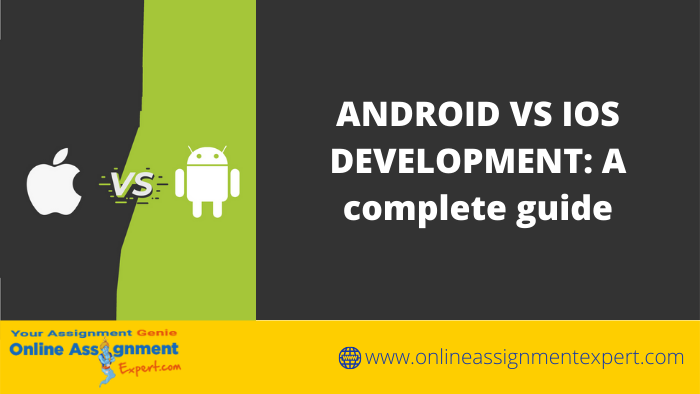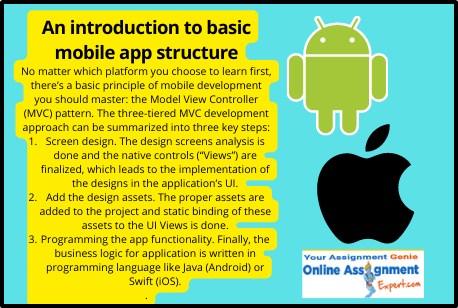
Mobile app developers can create various apps for a variety of operating systems, including blended and native apps for Android and iOS. With so many options, deciding which operating system to learn first might be difficult for a new mobile developer. At programming assignment help, we offer advice on choosing the best mobile development program for you.
Mobile development is the fastest-growing software business category, with several options and independent career opportunities. With newer versions of operating systems (OS), new hardware, and new technological prowess, mobile development and the profession of the mobile developer is expanding all the time. I have more than five years of experience developing iOS and Android apps. Based on industry level experience, assignment help is here to discuss some of the elements to consider while deciding which OS to specialize in first in this blog.
IOS and Android currently hold the majority of the smartphone market. According to recent statistics, the two platforms represent 96.7 per cent of the market. With such large audiences, iOS and Android provide a plethora of chances for developers interested in pursuing a professional life either in OS, each of which has advantages and disadvantages. Many mobile developers gradually aim to learn operating systems to broaden their skill sets. Still, newbies should start with the OS you want to learn first and gradually build up.
They say the first step is always the most difficult one. Getting familiar with any new technology takes time, and mobile application development is no exception. Expect it to take some time to learn, depending on how well you understand basic development principles.
Android and iOS both have different complexities and standards, which result in different learning times for both. iOS is a mature operating system compared to Android, and it has a predefined set of standards and rules. iOS strictly follows the rules, which often makes App Store approval difficult. iOS also has pretty good tools, like the newer Swift programming language, which potentially shortens its learning time.
With over 5000 devices from various vendors running various OS updates, form factors, and dimensions, Android is enormous. A developer must account for additional compatibility and testing during the development process. The outputs from Android software can be a little complicated, making it tough for a newcomer to understand without delving into the code's depths. Since Android is written in the Java programming language, programmers with a Java background may find it easier to convert to Android than iOS.
Development tools heavily influence mobile development. A iOS and Android development platform's existence and success over competing operating systems are guaranteed if it has mature development tools. For some developers, the ease with which an integrated development environment (IDE) can be a significant deciding factor. The more educated and discerning you are, the better.
For mobile development, iOS includes the Xcode IDE. Xcode is a fantastic programme with a lot of useful qualities and attributes. Xcode can be used to create apps for the iPhone, iPad, Mac OS X, and Apple Watch. Code completion, its UI design interface, managing directories' hierarchy, profiling, debugging, core data, asset management, and many other functions are the most important. Although Eclipse has been used previously for Android application development, it is typically not thought to give as pleasant an experience for programmers as Xcode. Android released "Android Studio," an official Android IDE regarded as superior to Eclipse. However, it lacks the additional functionality of Xcode. IDEs are typically a question of personal selection; pick the one that best suits your needs.
In summary, iOS has an advantage over Android when it comes to programming tools. You can get more assistance on this topic through our meticulous programming assignment help services.
Most major operating systems, including Windows, OS X, and Linux, are supported by Android Studio. Android apps can be created on a Windows, Linux, or Mac desktop, but iOS apps aren't as adaptable. Because Xcode was built to run solely on Mac computers, you'll need to get a Mac computer for iOS development. You won't be able to develop an iOS app on a Windows/Linux machine.
As a result, Android beats iOS in this category since it allows you to create Android apps for any operating system.
Developers must join Apple's membership programme to publish apps to the App Store on the iOS platform. Apple provides various programmes, each with its own set of specifications. A year-long individual programmer plan costs roughly $100, which can be too expensive for an independent developer just starting. On the other hand, Android development does not necessitate any form of registration or membership scheme. However, there is a one-time $25 registration fee to publish an app in the Google Play store. 5. Knowledge of the code you write and exposure to it.
For an app to be authorized and launched in the App Store, Apple has established criteria and rules that must be followed. A developer in Android has more flexibility and can experiment with alternative approaches for the same problem, such as building custom views or changing native views. This isn't limited to Android. However, it isn't allowed in iOS. Screens are created with a drag-and-drop interface during iOS development. Most interface applications can be done with a cursor and shortcut keys. The navigation controller, which has a graphical interface, is the sole way to add tabs. Thus you have fewer alternatives.
The Android UI software tool isn't quite as user-friendly, requiring you to enter XML code for the best screen design. Layouts and views in the Android UI desktop application are created in XML. Views' protective mechanisms, widths, borders, and cover a wide spectrum have all been coded. Designing displays in XML is advantageous since it allows you to assess a screen's View architecture quickly. Background Processing (Services), Broadcast receivers, Intents, and Content Providers are some Android-specific features that give developers a thorough understanding of the mobile platform. It also improves their design skills, which you can apply to other systems.

After comparing some of the most important iOS and Android development characteristics, iOS may appear to be a superior alternative for a newbie with less development knowledge. Programming assignment help expert services would suggest learning Android development if you have a previous desktop or web development skills.
Learning Android gives a clear view of how things function in the mobile world. Compared to iOS, it allows you greater control, enabling you to dynamically contribute and edit your screens and develop displays in XML from scratch, giving you a deeper understanding of how a mobile operating system works. You have less power over changing the default behaviour of views/apps in iOS, and screens are created using a desktop application (drag and drop).
Moreover, at assignment help services, you can get programming guidance related to Android or iOS. Android additionally gives developers more flexibility in solving challenges, allowing them to use any customized or native technique they desire. Consider the case when you want to use Tabs in your application. On Android, you can add tabs to the Action Bar via TabbedView, or even at the top or bottom of the app; however, on iOS, you have fewer options.
New Android developers have a lot of options. It enables you to test and deploy your software on the Google Play store and any other channel if desired. Although learning Android studio takes longer than learning iOS, its complexity might help you gain confidence in learning other mobile platforms and tools, such as iOS or Xamarin. In summary, programming assignment help services recommend viewing mobile design as a challenge. If you want to get into mobile programming, start learning Android. It will take you approximately 1-3 months to master it entirely. You can get assistance and guidance from the best programming experts in the world.For reference, feel free to explore an assignment sample related to mobile programming.
Get
500 Words Free
on your assignment today